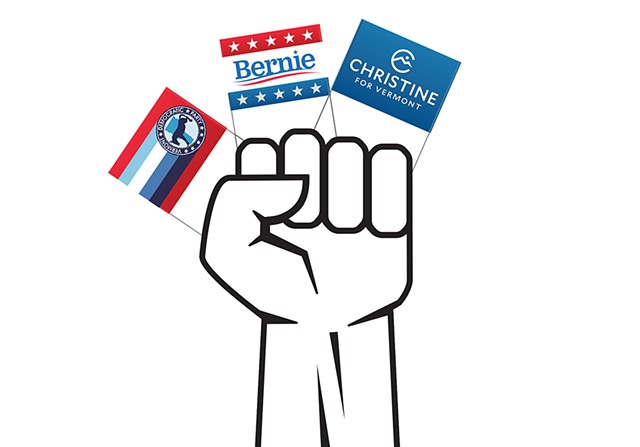
The labor movement has changed since Ray Bettis got his start operating cranes at a Barre granite shed nearly two decades ago. His union, the United Steelworkers Local 4, now represents librarians and municipal employees — not just coal miners, tire manufacturers and paper mill workers.
Still, Bettis was surprised when a pair of political operatives from the Vermont Democratic Party approached him two years ago to ask whether they could join the Steelworkers.
"I was blown away," the Local 4 president said. "I didn't even think it could be done."
Turns out, it could. Within months, all four of the party's rank-and-file staffers had signed cards requesting to be represented by the Steelworkers. In November 2017, the VDP's state committee voted unanimously to recognize the staff union — making it the first political party in the country to do so.
"There was a really strong desire to show, look, the Democratic Party isn't just paying lip service to organized labor," said Brandon Batham, one of the two VDP staffers who first approached Bettis. "We are showing that our employees are going to walk the talk."
Political campaigns soon followed the Vermont party's lead.
During the 2018 campaign cycle, staffers on more than two dozen legislative, congressional and gubernatorial campaigns voted to join a union. Earlier this month, newly hired employees of Sen. Bernie Sanders' (I-Vt.) presidential bid became the first to unionize a national campaign. Several of Sanders' rivals for the Democratic nomination have said that they, too, would welcome a staff union, suggesting that thousands of political operatives could join the labor movement this election cycle.
Though phone-bankers and press secretaries may not resemble the stereotypical labor unionist, organizers say that campaign workers need protections as much as anyone — and, perhaps, even more.
"The general nature of campaigns for staff is very exploitative," said Ihaab Syed, a 26-year-old law school student who worked for Sanders' 2016 campaign. "It's very fast-paced. It's very hard to stand up for your own rights when you believe in the mission so much and you feel you have to be a martyr."
Around the time VDP staffers approached the Steelworkers, Syed and other Sanders alums were creating the Campaign Workers Guild — the first union focused exclusively on representing political staffers. By the end of the 2018 election cycle, it had hammered out 29 collective bargaining agreements with parties and campaigns — not surprisingly, all Democratic — including that of Vermont gubernatorial candidate Christine Hallquist.
Many of the Guild's demands are predictable: better pay, fewer hours and access to health insurance. Others are more novel: safe housing on the campaign trail and prompt reimbursement for volunteer pizza.
According to Kate Bronfenbrenner, the director of labor education research at Cornell University's School of Industrial and Labor Relations, organizing is also "one of the best ways" to combat the sort of sexual misconduct common on campaigns. She noted that Sanders staffers had nowhere to go when they experienced harassment on his 2016 presidential campaign.
"But now there's a union," Bronfenbrenner said.
Like most trade unionists, Guild members pay monthly dues, but they get a discount when they're between organized campaign gigs. Unlike many unions, the Guild doesn't endorse political candidates — a recognition that doing so could pose a conflict of interest. (The Steelworkers do endorse, but VDP staffers have pledged to sit out such votes.)
Syed, who serves as secretary of the Guild, acknowledges that political staffers can be "challenging" to organize. "It's a very transient workforce, and campaigns are essentially large startups — in some cases, small startups — that operate for a very short period of time."
That gives union members little time to negotiate contracts but plenty of leverage over candidates who are racing against the campaign clock.
When talks break down between labor and management, the consequences can be catastrophic. That happened last September when, two months before Election Day, Ohio Democratic Party staffers represented by the Guild threatened to strike after their bosses hired a law firm viewed as anti-union. The two sides ultimately agreed to a contract, but not before dragging Ohio Democratic candidates into the dispute.
The Guild's early success organizing political campaigns has caused an unexpected problem: Traditional labor unions are now competing with them for members. When a majority of 44 union-eligible Sanders staffers — anyone under the rank of deputy director — signed cards this month, they chose to be represented not by the Guild but by the United Food and Commercial Workers Local 400, which serves 35,000 workers in Washington, D.C., and six nearby states.
Syed's organization cried foul. "The Campaign Workers Guild tried for nearly two months to get a meeting with Bernie 2020 ... but our requests were ultimately ignored," it said in a written statement.
Syed would not elaborate on the tiff, and the Sanders campaign declined to comment. Jonathan Williams, a spokesperson for UFCW Local 400, said he found the Guild's statement "a little bewildering."
According to Williams, the Sanders campaign conducted itself appropriately during the organizing drive and committed to begin contract negotiations immediately. He said his union, which hasn't previously represented campaign workers, was busy surveying its new members to understand their priorities.
"It's pretty early in the process and too soon to speculate what the contract will look like," Williams said.
In Vermont, both the state party and Hallquist's campaign held relatively harmonious contract negotiations last year, according to those involved. It helps when even management is pro-labor.
Cameron Russell, who served as Hallquist's campaign manager, said he and his boss agreed early on that they would support a staff union. "If you want a team that works well and has each other's backs, putting it in writing has benefits," Russell said.
The two sides negotiated a contract that guaranteed a $15 minimum wage, paid time off and a limit of six workdays per week. It also suggested that the workday be no longer than eight hours "when possible," though Russell acknowledged that his staff was "excited to work a lot of hours for Christine."
Hallquist, who previously served as CEO of the Vermont Electric Coop, had spent years negotiating with the International Brotherhood of Electrical Workers — an organization that drove a harder bargain than her devoted campaign staffers. "I gotta tell you, I've worked with unions for a long time, and it was the smoothest negotiation I've ever seen," she said.
The candidate recalled one session last summer when both sides gathered to renegotiate their contract. "We went in and asked what their demands were, and they didn't have any, so we gave them a raise they didn't ask for," Hallquist said with a laugh.
Unlike campaigns, political parties don't have an end date, so the needs of their workers are different. According to Batham, the VDP operative who helped organize the party, one goal was "to professionalize the staff" and reduce turnover. "It really gets intense during campaign seasons," he said. "We wanted to encourage people to not burn out so quickly."
The VDP typically employs a year-round skeleton staff and ramps up every two years to run a "coordinated campaign" to assist all Democratic nominees in the state.
The party's first three-year contract, which was signed last December, provided some new benefits, such as vision insurance, and formalized others, such as an annual cost-of-living adjustment. More importantly, said Batham, it prevented the party's leadership from firing employees without cause and established a framework for determining which employees would be let go when money is tight.
Both provisions are key, he said, because of the frequent turnover in the party's leadership and the fluctuation of its coffers. "We wanted job protection and job security independent of who's sitting in the chair's seat at the time," Batham said.
Terje Anderson, who took over as party chair after the staff voted to unionize but before it settled on a contract, said there was minimal "huffing and puffing on either side" of the negotiating table. Both camps agreed early on in the process that neither employee strikes nor management lockouts would be permitted, he said.
Like Hallquist, Anderson had prior experience with unions, but not representing management. Early in his career, he was a United Automobile Workers member at a Black & Decker plant in Maryland. Later, he was a member of the Vermont State Employees' Association. His grandfather and great-grandfather were union coal miners in western Pennsylvania.
"I've got union blood," he said.
Anderson conceded that "not much has changed" in the party's compensation package since its employees joined the Steelworkers, but morale has improved.
"This sends a message to people that they're not just disposable folks who are going to get fired on the whims of some new person who comes in and doesn't care for them," Anderson said. "I think that has changed the outlook of people on staff."


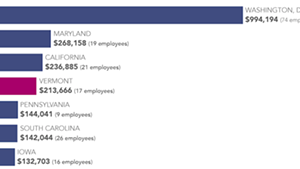
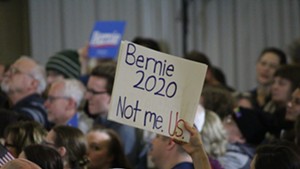
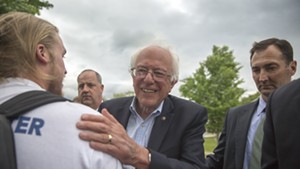
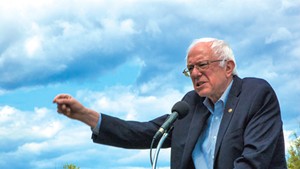
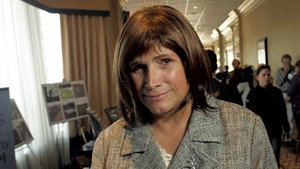








Comments
Comments are closed.
From 2014-2020, Seven Days allowed readers to comment on all stories posted on our website. While we've appreciated the suggestions and insights, right now Seven Days is prioritizing our core mission — producing high-quality, responsible local journalism — over moderating online debates between readers.
To criticize, correct or praise our reporting, please send us a letter to the editor or send us a tip. We’ll check it out and report the results.
Online comments may return when we have better tech tools for managing them. Thanks for reading.